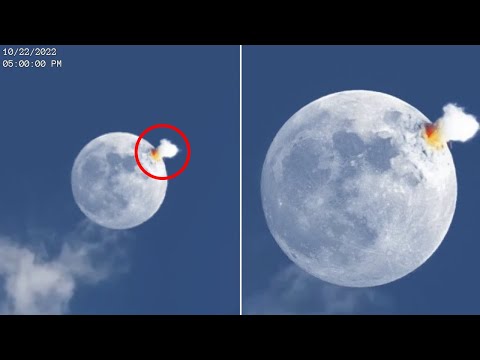
So, this is why we haven’t gone back to the Moon..
In April of 1972, astronaut Charles Moss Duke traveled to the moon as part of the Apollo 16 mission. Approaching our satellite, the astronaut saw strange flashes on its surface. Real fireworks started right in front of it. He wasn’t alone in witnessing this strange phenomenon. Almost every astronaut on the lunar expeditions mentioned the unusual glow. Furthermore, the lunar flashes were also detected from Earth. In September of 2022, Ruben Ariza from Colombia shot a 5-minute video that clearly shows the lunar fireworks. But what kind of odd phenomenon is this? And why hasn’t science been able to solve the lunar anomalies for so many decades? Despite being closer to us than any other space object, the moon still baffles scientists. People began wondering about its origin thousands of years ago. In the ancient city of Tiwanaku, on the walls of the ancient temple of Kailasasaya, there are writings preserved, according to which the moon emerged about 12,000 years ago. Drawings of the Hopi people include a ciphered story of how the moon brought disasters never seen before. Their legends contain descriptions of our planet’s tumble and swing, changing its orbit and rotation speed. While the legends of the African Zulu people say that the moon is a flaming dragon’s egg, two brothers with scaly skin stole it, hollowed out its yolk, and left its shell in the sky. But even thousands of years later, today’s scientists have no definitive answer to the question of the moon’s origin. According to one theory, in the past, Earth and the moon were in different parts of the solar system. This theory could have put an end to disputes on the moon’s origin, except for one finding that bewildered scientists. The fact is that rocks identical to those of terrestrial origin were found on our satellite. So if our planet and the moon formed in different parts of the universe, how can they consist of some of the same stuff? Professor Sarah Russell from London’s Natural History Museum suggests another theory. She thinks the moon and Earth could have formed together. 4.5 billion years ago, when our planet was only just forming, it spun very fast, so fast that part of its crust split and ended up in its orbit. These scraps then formed the satellite. But the problem is that in this case, the composition of the moon and Earth should be identical. Partly, the first findings by the Apollo astronauts could prove this theory, but soil samples from the far side of the moon showed that its composition over there is absolutely different. An explanation for this inconsistency can be found in the giant impact hypothesis. In 1898, English astronomer George Darwin suggested that 4.5 billion years ago, Earth collided with a protoplanet called Theia about the size of Mars. This impact was so powerful that it could have destroyed the Earth and life would have never appeared in the solar system. Luckily, that didn’t happen. With the devastating impact threw most of Theia’s rock and some of Earth’s mantle into Earth’s orbit, these fragments eventually formed the moon. This explains the oddities in our satellite’s chemical composition. Most probably, the dark side of the moon contains some of Theia’s debris. However, this theory doesn’t explain the origin of lunar rocks older than the solar system. In 1973, researchers found that some lunar rocks are over 5 billion years old. On the other hand, Earth and the other planets of the solar system formed 4.6 billion years ago. This discovery prompted researchers from the University of California to assume that the moon actually emerged almost 2 billion years earlier than Earth. Our satellite possibly formed in another star system. Then the sun’s powerful gravity captured the moon, which eventually became Earth’s satellite. If that’s the case, all this time an object that literally flew in from the depths of space has been revolving around the Earth. But the problem is that none of these scientific hypotheses has been 100% proven. In the millennia of studying the moon, not only hasn’t humankind approached the mystery of its origin, but quite the opposite, it has become even more confused.
Discussed in this video:
Something Terrifying is Happening on the Moon
Found on the Moon
What is Going On with the Moon
Something at the Moon
#moon #earth #events